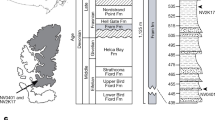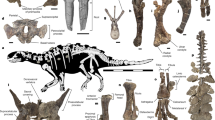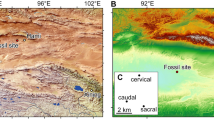Abstract
Ascaphus (North America) and Liopelma (New Zealand) constitute, according to Dr. G. K. Noble, the Liopelmidæ, the most primitive anuran family in existence. Apart from the importance of Ascaphus from the general phylogenetic aspect, it has often been credited with possessing a tail. Noble has described a pair of tail-wagging muscles for the genus. Moreover, Ascaphus possesses a prepelvic skeletal structure of the nature of a prepubis (or epipubis) and is further notorious in possessing post-pelvic ‘Nobelian cartilages’ (Mehelij). Presumably the epipubis and the Nobelian cartilages represent chondrifications of the pre- and post-pelvic portions of the linea alba respectively. The latter are known in Ascaphus only.
This is a preview of subscription content, access via your institution
Access options
Subscribe to this journal
Receive 51 print issues and online access
$199.00 per year
only $3.90 per issue
Buy this article
- Purchase on Springer Link
- Instant access to full article PDF
Prices may be subject to local taxes which are calculated during checkout
Similar content being viewed by others
Author information
Authors and Affiliations
Rights and permissions
About this article
Cite this article
DE VILLIERS, C. The ‘Tail’ of the Male American Toad, Ascaphus. Nature 131, 692–693 (1933). https://doi.org/10.1038/131692b0
Issue Date:
DOI: https://doi.org/10.1038/131692b0
Comments
By submitting a comment you agree to abide by our Terms and Community Guidelines. If you find something abusive or that does not comply with our terms or guidelines please flag it as inappropriate.



